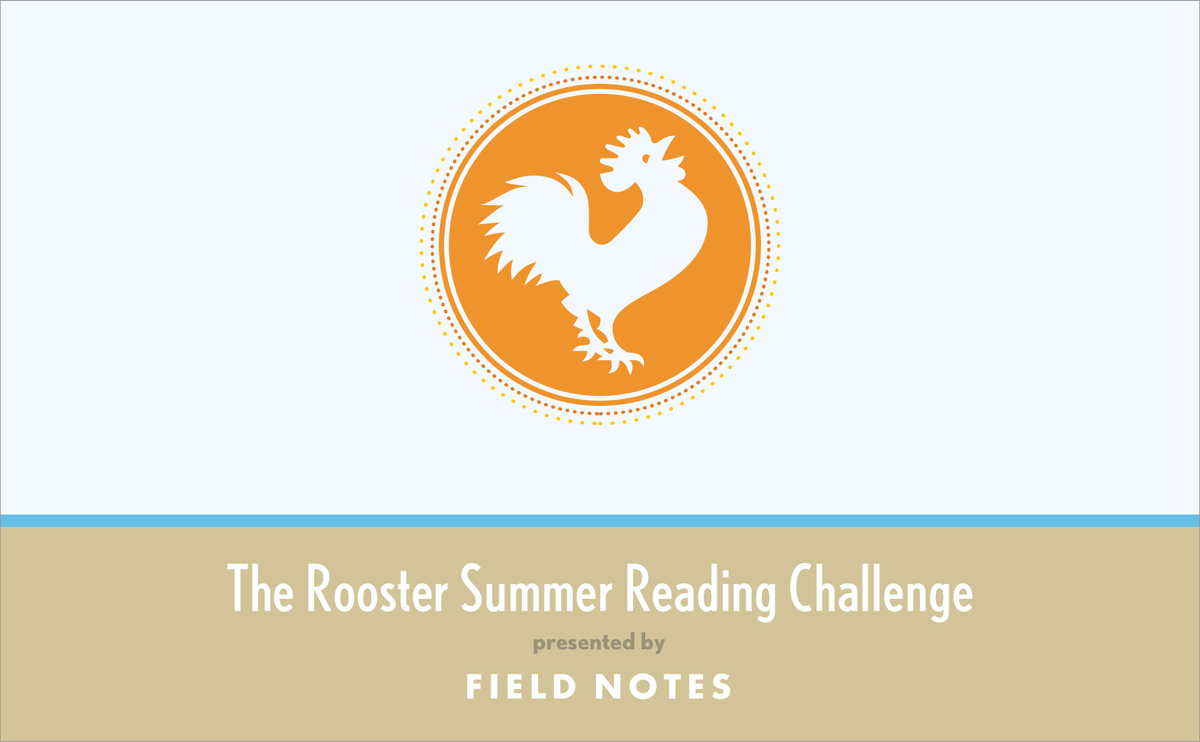The Rooster Summer Reading Challenge: Week Four
We're at the end of our first month in the Rooster Summer Reading Challenge. Victor LaValle joins us to discuss the second half of The Night Ocean, and we decide which of our two novels from June heads to the end-of-summer final.

Welcome to the Rooster Summer Reading Challenge, brought to you by The Morning News Tournament of Books and our presenting sponsor, Field Notes. All summer long, we’re reading two novels a month and reconvening on Wednesdays to discuss the books. Joining our chats is a monthly guest judge, who at month’s end decides which title heads to our summer championship on Aug. 30—when you choose which book gets an automatic berth in the 2018 Tournament of Books.
For June we’re reading A Separation by Katie Kitamura (selected by the ToB Committee) and The Night Ocean by Paul La Farge (chosen by Amelia Gray, who will be joining us in July), with novelist Victor LaValle.
- Plan your summer reading: Ill Will (page 237 by July 5, finish by July 12); Marlena (first half by July 19, finish by July 26); Temporary People (first half by Aug. 2, finish by Aug. 9; Fever Dream (first half by Aug. 16, finish by Aug. 23)
- Catch up on previous chats: A Separation first half, second half; The Night Ocean first half
- Jump into this week’s discussion in the comments
Last week we discussed the first half of The Night Ocean, and this week we’re discussing the remainder of the book, through the end, and making the call on which book goes to our August championship.
Andrew: Thanks, everyone, for weighing in last week on how to solve this month’s judging conundrum. You elected Rosecrans to choose which on this month’s two books—A Separation or The Night Ocean—heads to our August final. But first, let’s hand it over to Rosecrans and Victor and discuss the second half of The Night Ocean.
Victor LaValle is the author of the short-story collection Slapboxing With Jesus, three novels, The Ecstatic, Big Machine, and The Devil in Silver, and two novellas, Lucretia and the Kroons and The Ballad of Black Tom. His latest novel, The Changeling, was published on June 13.
Rosecrans Baldwin is the author of You Lost Me There and Paris, I Love You but You're Bringing Me Down. His nonfiction appears in a variety of magazines, most often in GQ. He co-founded TMN with publisher Andrew Womack in 1999. His latest novel, The Last Kid Left, was published on June 7.
Rosecrans: So yes, we’ve come to the end of The Night Ocean. We’ve solved the riddle of the Spinks as best as possible—spoiler alert: With much fakery, a small-town Canadian with a strong dislike for humanity pretty much faked the whole thing—and we’re left with Mal in the ocean, beginning her life post-Charlie, spotting a person waving to her on the beach. (Charlie ftw? Charlie wtf?) I’ve let the book settle and I’ve got my own impressions, but I want to hear from you first, Victor: What stayed with you? Having read it before, what did you come away with this time?
Victor: What stayed with me most this time, and was there when I first read it too, was the unraveling of Spinks’s identity. There’s that moment right toward the end when Mar asks him why he did it and he cops to a hatred of humanity, in total. I found that so chilling before and still did this time.
Rosecrans: I had the same experience. I didn’t see it coming, as a rationale for his behavior, but I bought it, I believed it. Odd, because in other hands I might’ve felt like I’d just undergone this long shaggy-dog story.
Victor: In a way its greatest impact comes precisely because the stakes are so damn low. When you go through this long, convoluted history—two histories really, both of Barlow and Spinks—only to discover that this man went to so much trouble merely to grind out a grudge. My God, imagine that level of ugliness. It would be as if a James Bond villain somehow built an entire world-spanning secret agency simply to send James Bond a string of pizzas he didn’t order. There’s something perverse about even the way it seems like La Farge is giving us something big and in the same instance so small. I’d be tempted to call it one great big practical joke except that real lives (well, fictional lives) are irrevocably altered because of this one petty man.
This almost seems to be the point of the novel to me. (Though I’m loathe to suggest any book this smart is trying to make one “point.”) One man this inventive and small becomes Spinks. Another man this inventive and small becomes H.P. Lovecraft.
Rosecrans: I love that distillation, I hadn’t put it together that way.
Victor: How about Marina, what role did she seem to play for you in the end? She’s basically become a Barlow for Charlie, right?
Rosecrans: The further Marina got from Charlie, the more I sided with her. We’re all detectives in our lives—even when we’re just trying to figure out why our friend hasn’t answered that text yet. So Mar’s journey to answer the riddle(s) makes sense to me—more sense than her interest in her relationship with Charlie, which I never quite believed. I kept expecting the ending to get weird, surreal, Lovecraft-ian, otherworldly. The fact that La Farge decided against a more supernatural finish earns him points in my book. Same for his tremendous storytelling throughout. Multiple times I was in a story or place I didn’t care much about on an interest level—e.g., coincidentally bumping into William Burroughs yet again in Mexico; plus I’m not much of a horror or sci-fi reader, and I didn’t know anything about Lovecraft coming into this book—but I didn’t have any trouble turning the pages. If only because the drama and detail were so well done. I never really noticed that I was in the middle of a pretty hefty book.
As Andrew mentioned, today I’ll be the one making the final call between The Night Ocean and A Separation, but help me out a bit. To look at both books, what do you think each did best? What did you admire most about each work?
Victor: Both these books were beasts for atmosphere. That atmosphere being internal as much as external. The perspectives of the unnamed narrator in A Separation and Marina in The Night Ocean are both estranged. Meaning, literally distanced from the one they love, alienated. But A Separation’s narrator goes on her quest reluctantly, out of obligation, while Marina is on a hunt for…what? For Charlie, maybe. But even more it might just be for answers, an answer. When she asks Spinks why he drew her in, spun such an elaborate lie, she might as well be asking her husband, or the fandom of Lovecraft, or Lovecraft himself. Why are you like this? Marina really wants to know. Meanwhile A Separation’s narrator really just wants to get the hell out of Greece.
As for admiration, both books are wildly intelligent and it shows on every page. I also appreciated the way both of them stuck to the principles of their narrators. I just mean that neither book was going to crack a door open and finally answer all the big questions with one clear, simple summary. And yet I know I came away feeling quite satisfied by each book. Maybe not the meal I’d been expecting—a missing husband whodunit; a Lovecraftian sendup—but something else entirely.

Field Notes Limited-Edition for Summer is Campfire. Campfire features three original photos that have been line-screened and carefully spot-printed, for a vintage feel, and each pack comes with a custom “Campfire Master” patch, ready for your scout sash or messenger bag.
All in all, I enjoyed both novels, and I felt sure no authors but these two authors could have woven together these exact books. I mean that as the highest compliment. These books are theirs and no one else’s.
Rosecrans: On that I especially agree, and I think it’s a fantastic thing, one of the things I love most about reading novels. I love putting down a completed book with the sense that I just spent a lot of time with a single intelligence behind the scenes.
Victor: You’d mentioned getting only a few pages into The Night Ocean and asking yourself what the hell you were reading. Could you have ever guessed that you’d end up where you did? Which aspects of the second half were most surprising? Was there anything you saw coming from a hundred pages away?
Rosecrans: To be honest, I was most surprised that I wouldn’t mind hanging out with Marina so much; I found her irritating and two-dimensional at the start. But then she grew—and grew on me. And in terms of surprises, I sort of knew that Spinks’s flip-flops would be in the works, but I didn’t know how. I’d also started to think of these books in comparison by that point. To use gymnastics terminology for a second, in my reading, The Night Ocean really stuck the landing here, in ways A Separation didn’t.
Somewhere in the second half, that Spinks is called a zero, “Spinks was zero.” I immediately thought of A Separation’s narrator, who has her own zero-like qualities. Into which narrator’s head, of these two books, did you go deepest?
Victor: I’d say I learned the most from The Night Ocean’s narrator but I felt closest to A Separation’s. This seems odd since Marina actually does share many recognizable reactions throughout the book. She gets pissed at Charlie, she keeps her distance, even their courtship has a pleasantly knowable nerdy charm. But as the book progresses she becomes more interested in the figures like Barlow and Spinks so her own qualities fade to the background a bit. I adored the wide swaths of history being shared—and the surprising moments of overlap between one intellectual world and another—but they were less to do with Marina, really. It was only toward the end, as she breaks into Spinks’s home and discovers his lies that I felt attached to her again.
Meanwhile A Separation’s narrator is hardly as giving, and her reactions to events are almost never those I’d imagine for myself, but it’s with her that we remain from start to end. Though her thoughts might, at times, give me pause, I never felt that any aspect of her was hidden from me. (Though at times I had to consider that she simply didn’t feel or see things as I would.) This created an odd kind of closeness for me. I would never imagine we’d become friends, but I felt I understood her in ways that I don’t understand even good friends. That was remarkable to me.
And for you? Did you have a preference for one over the other? Was there a moment when you felt the switch flip, if so?
Rosecrans: Good questions—and to answer them leads me to my decision, in which I need to send one of these titles to the summer’s big showdown at the end of August.
But before I do that, let me say a big thank you to Victor for joining us this month with all of his thoughtful analysis. Readers, if you haven’t checked out his new book, The Changeling, you’re in for a treat.
I enjoyed both of these books viscerally as a reader. As a writer I appreciated a lot of their style, their construction. They’re tough to consider together. If I worked in a bookstore, I’d be eager to recommend them, but to different types of customers. Here’s what I mean. Like Victor, I felt closest to A Separation’s narrator. I could understand her reactions and even begin to anticipate them. Her behavior, her impulses, her withdrawal, her interiority—it all lended to an atmosphere inside and outside her mind that I found captivating, no matter how small the scale.
The Night Ocean is just bigger. Not only longer, but with a much larger universe. Multiple atmospheres, more characters, more perspectives, a greater timespan. Plus historical figures, true events, more detailed and real-seeming scandals. Barlow and Spinks, as characters to observe—though not necessarily inhabit—are wrinkled and rich with detail; they’re so charged by events, they scintillate.
I like novels big and small, but err to the latter. I like stories plot-filled and plot-empty, but lean to the former. What it comes down to for me, most frequently, is an interesting narrator. I just love that experience of being in someone else’s head for a long period of time, and I can’t get it anywhere else but great fiction. It’s not a matter of first- or third-person perspective, or pirate adventures vs. riding an escalator, but some weird combination of mundanity and uniqueness in a character so that I feel, after a couple hundred pages, that the person on paper is both one of us and also solely themselves. And that experience, mainly because I never personally connected with Charlie or Marina in The Night Ocean, was more available to me in A Separation.
But here’s the switch. As much as I enjoyed my time with A Separation’s narrator’s thoughts and feelings, and the many echoes of the book’s events in its quiet spaces—many beautiful moments of irony, reflection, doppelgangers, many odd emotional duets of the narrator and other humans—in the end the narrator’s experiences didn’t matter that much to me because they didn’t seem (to me) to matter that much to her. Which means I’m siding with The Night Ocean. It’s a close call. These are two novels with their own separate, discrete forms of excellence. And the stakes are high in both stories. But it seemed like the characters cared to recognize that to a greater degree in The Night Ocean, and that’s a human compulsion that sings to me.
This month’s winner: The Night Ocean
Andrew: We have our first book in the ring for the end-of-summer final, and now we’re heading into our July matchup: Ill Will by Dan Chaon versus Marlena by Julie Buntin. Joining us next month to discuss the pairing will be Amelia Gray, in conversation with Rosecrans Baldwin. Next Wednesday, July 5, we’ll discuss the first half of Ill Will, through page 237.

